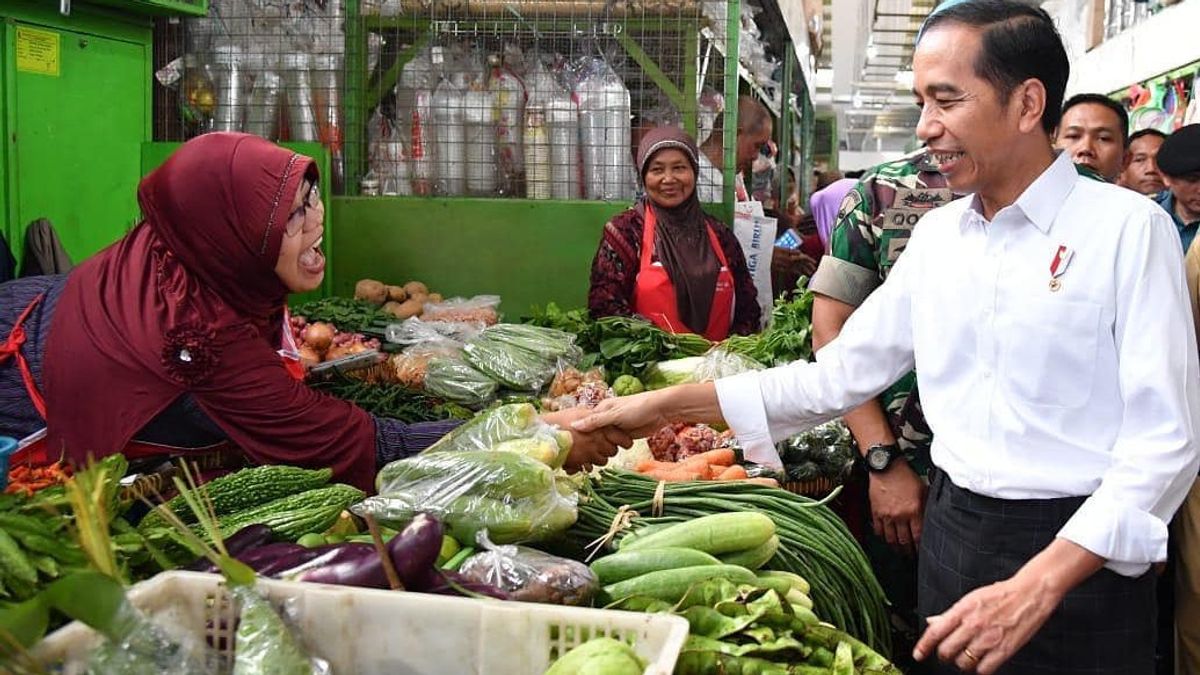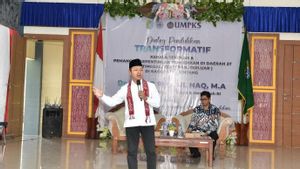JAKARTA - Concerns about the availability and smooth distribution of food nationally during the COVID-19 pandemic are felt not only by consumers, but also by local suppliers. However, the government guarantees that food distribution will run.
Head of the Center for Food Distribution and Reserves, Food Security Agency of the Ministry of Agriculture, Risfaheri, said that the Jakarta, Bogor, Depok, Tangerang and Bekasi (Jabodetabek) areas are now indeed a red zone in the spread of COVID-19. Even so, the food needs for the community must still be fulfilled.
"Even though it is a red zone, people still need food. Our farmers continue to produce and distribute them smoothly," he said in a written statement received by VOI in Jakarta, Saturday, March 28.
The Ministry of Agriculture, he said, will always ensure the stock and production of foodstuffs are available in the upstream sector. Meanwhile, the smooth distribution lies in the main tasks and functions of the Ministry of Trade (Kemendag).
Risfaheri said that the COVID-19 pandemic is related to people's lives. Therefore, the Ministry of Agriculture strives to make the food reach the community so that it can be fulfilled.
The Ministry of Agriculture coordinates with PD Pasar Jaya in DKI Jakarta, Gapoktan and other business actors to ensure food needs can be met smoothly. "We always try to keep supplies available. The Indonesian Farmers Shop Center in Jakarta and Bogor remains open and always provides food at affordable prices," he said.
According to him, TTI has a strong psychological effect and the presence of TTI has spread to become an alternative for the community to get quality and affordable staple food. The availability and smooth distribution to TTIC was also recognized by the Manager of the Indonesian Farmers Shop Center, the Food Security Agency (BKP) of the Ministry of Agriculture, Inti Pertiwi Nashwari.
"Nobody stops the supply of food from farmers to Jakarta, especially to the Indonesian Farmers Shop Center (TTIC). So there is no need to worry that TTIC and TTI will remain open to meet the food needs of the community," said Inti.
Inti, who is also Head of the Food Distribution Division, the Ministry of Agriculture's Food Security Agency, added that all suppliers and champion farmers collaborated with the Ministry of Agriculture. "For shallots, our champions are always there whenever we ask and every other supplier is always ready to be asked for supplies at any time," he said.
Inti explained, every day TTIC and TTI are always open to serve buyers. For TTIC Pasar Minggu, for example, the incoming meat supply is always above 2 tons to meet the people's needs. Not to mention eggs that reach 500-700 kg and rice reaching 5 tons which are always restored every 2-3 days from West Java farmers.
Based on data from the Indonesian Farmer Shop, BKP, until now there are 2 Indonesian Farmer Shop Centers located in Jakarta and Bogor. Meanwhile, 232 Indonesian Farmer Stores (TTI) are spread across DKI Jakarta, 143 TTI in Bogor, 5 TTI in Bekasi, and 24 TTI in Tangerang and South Tangerang.
"Price stability in the market has also been the focus of the Ministry of Agriculture and the Ministry of Trade to date. If necessary, market operations will be carried out," he said.
Innovation
The conditions of the COVID-19 pandemic in Indonesia have led to innovations among young people. Among them, a service company providing agricultural products, Ayomart. This startup provides an online system-based ecommerce platform for agricultural products.
Ayomart Founder and CEO Jatu Barmawati said the company also provides kitchen necessities such as spices, vegetables and fruit, which can support the availability of staples while following the central government's policy in breaking the chain of the spread of COVID-19. "Now the policy is work from home. Well, to meet the needs at home. We have prepared it through an online shop called Ayomart," he said.
Jatu explained, so far Ayomart provides 160 main commodities such as broccoli, long beans, kale, chayote, chilies, tomatoes, onions and many others. Ayomart also provides a variety of fruits such as avocado, orange, mangosteen, banana, salak and soursop.
"For ordering, people only need to open our website or through a customer service connection. After that, fill out the order form, make payments to the account number and then just wait for the goods to arrive," he said.
This provision is a joint movement as well as a real action from the millennial farmer ambassadors (DPM) of the Ministry of Agriculture to be alert to the corona in helping to provide food availability for the community. "As a resident of Jakarta, I understand very well the difficulty of getting food supplies due to the dangers of leaving the house. Therefore, as a DPM, I try to make it easier for people to access food supplies without having to leave the house," he said.
According to Jatu, this step also answers farmers' complaints, where they are confused about marketing their products because many traditional markets are closed, due to lack of visitors due to calls to stay at home and physical distancing.
"So we also initiated and facilitated the #DPMSIGAPCORONA program with the concept of farm to you. So DPM colleagues in the upstream or farmers can report what products can be sent to the public in Jakarta through us, and we are trying to help market it," he explained.
Jatu said that in the meantime his party would focus first on Jakarta, which has the highest number of COVID-19 victims in Indonesia. In the future, all DPMs can open Ayomart branches in their respective locations in order to facilitate supply chain access.
The English, Chinese, Japanese, Arabic, and French versions are automatically generated by the AI. So there may still be inaccuracies in translating, please always see Indonesian as our main language. (system supported by DigitalSiber.id)









